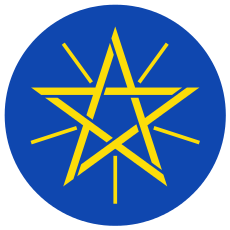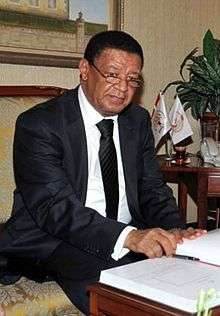President of Ethiopia
| President of the Federal Democratic Republic of Ethiopia | |
|---|---|
|
Coat of Arms | |
| Residence | National Palace, Addis Ababa |
| Term length | Six years, renewable once |
| Inaugural holder | Mengistu Haile Mariam |
| Formation | 10 September 1987 |
 |
| This article is part of a series on the politics and government of Ethiopia |
|
|
Judiciary
|
The President of Ethiopia, officially the President of the Federal Republic of Ethiopia is the head of state of Ethiopia. The position is largely a ceremonial one, with executive power effectively being exercised by the Prime Minister of Ethiopia. The current president is Mulatu Teshome, who took office on 7 October 2013. Presidents are elected by the House of Peoples' Representatives for six years, with a two-term limit.
History
The presidency was created in its original form by the 1987 Constitution, which established the Communist People's Democratic Republic of Ethiopia. He was elected to a five-year term by the National Shengo (legislature), with no term limits. He was vested with sweeping executive powers. For instance, when the Shengo was out of session, he had the right to appoint a number of state officers. Although such appointments required legislative confirmation, in practice this was merely a formality. He was also chairman of the Council of State, which acted for the Shengo when it was out of session. While he, like all other state officers, was nominally responsible to the Shengo, in practice the principles of democratic centralism effectively made him a dictator. The only president under this system was Mengistu Haile-Mariam.
Following the overthrow of the Communist regime at the end of the Ethiopian Civil War, the presidential office took its current form in stages, culminating in the adoption of the current constitution in 1995.
Election
The president is elected by an absolute majority in the House of Peoples' Representatives. If no candidate has received an absolute majority by the third round of voting, a simple majority is sufficient. When electing the president, members of the parliament vote by a show of hands.
Any Ethiopian citizen who is a resident of the State is eligible to run for president. The office falls vacant upon completion of a term, resignation, or the decision of three-quarters of the House of Peoples' Representatives (parliament)to remove the president on grounds of misconduct or incapacity. Presidential tenure is not keyed to that of the House of Peoples' Representatives in order to assure continuity in government and the nonpartisan character of the office. There is no vice president in the Ethiopia governmental system. If the president is temporarily incapacitated or leaves office, the speaker of the House of Peoples' Representatives becomes acting president.
Role
The 1995 Ethiopian Constitution lays out the duties and powers of the President of the Republic, to include:
- In foreign affairs:
- Accrediting and receiving diplomatic functionaries;
- Ratifying international treaties, upon authorization of Parliament (if required according to Article 80 of the Constitution);
- Making official visits abroad, accompanied by a member of the government; and
- Declaring a state of war, as decided by Parliament.
- In parliamentary affairs:
- Calling the Chambers of Parliament into extraordinary session and dissolving them; and
- Calling elections and fixing the date for the first meeting of the new Chambers.
- In legislative matters:
- Authorizing the presentation of proposed governmental bills to Parliament;
- Promulgating the laws approved in Parliament; and
- Remanding to the Chambers (with an explanation) and asking for reconsideration of a bill (permitted once per bill);
- Appertaining to popular sovereignty:
- Calling referenda.
- In executive matters and as to official protocol:
- Naming the Prime Minister of Ethiopia, and appointing Cabinet ministers on the advice of the PM;
- Accepting the oath of the government;
- Receiving the resignation of a government;
- Promulgating laws by decree, which are proposed by the government alone. These measures, unless acted on by Parliament, after 60 days;
- Naming certain high state functionaries;
- Presiding over the Supreme Defense Council, and commanding the armed forces; and
- Decreeing the dissolution of regional councils and the removals of presidents of regions.
- In judicial matters:
- Presiding over the Superior Judicial Council;
- Naming one-third of the Constitutional Court; and
- Granting pardons and commutations.
Unlike most parliamentary republics, the President of Ethiopia is not even the nominal chief executive. Rather, the Constitution explicitly vests executive power in the Council of Ministers, and names the Prime Minister as chief executive. Many of the president's powers are duties that he must perform, while most of the others must be countersigned by a member of the government (either the Prime Minister or an individual minister) to be valid. However, pardons and commutations have been recognized as autonomous powers of the President.
Latest election
See also
- Emperor of Ethiopia
- List of Presidents of Ethiopia
- List of heads of government of Ethiopia
- Rulers of Ethiopia
